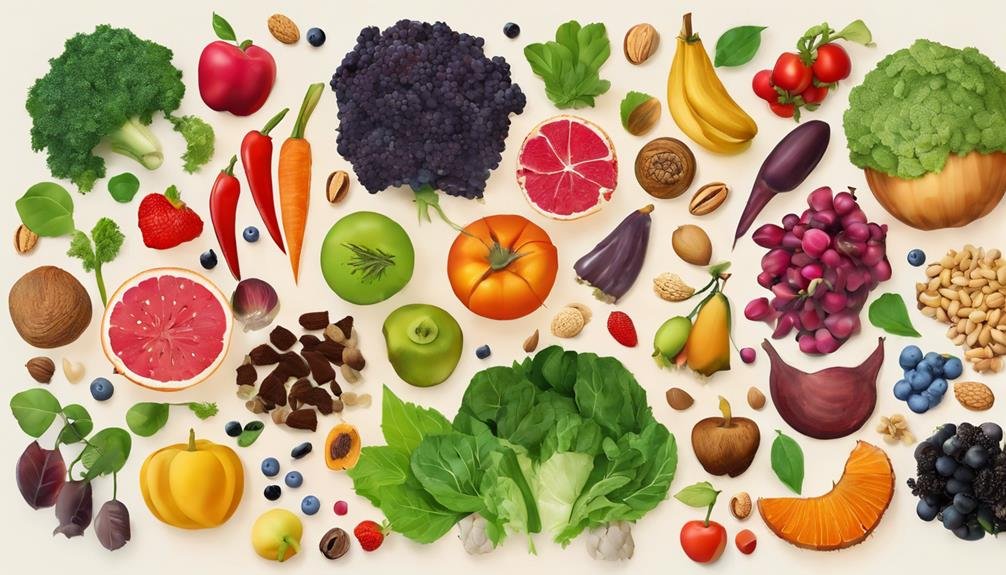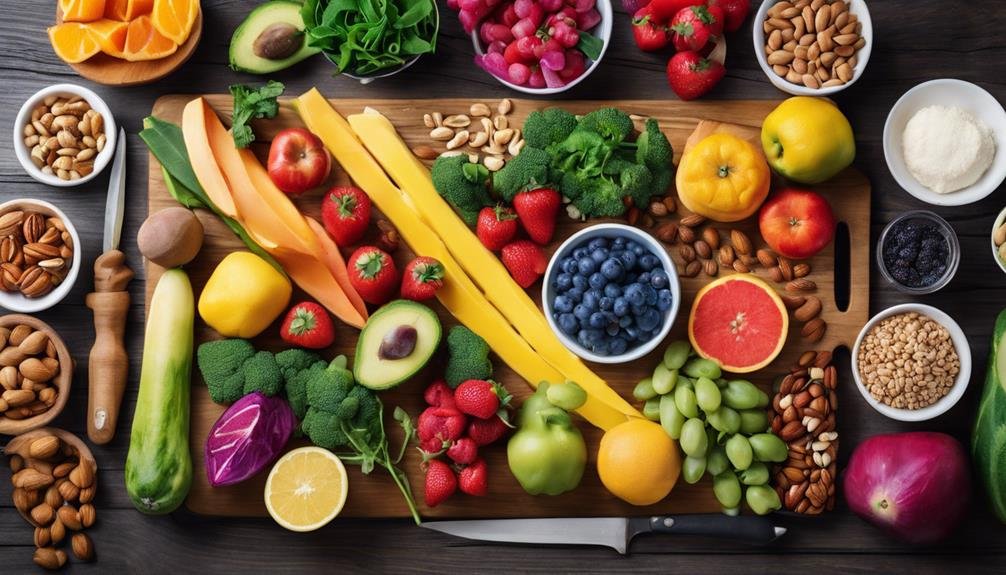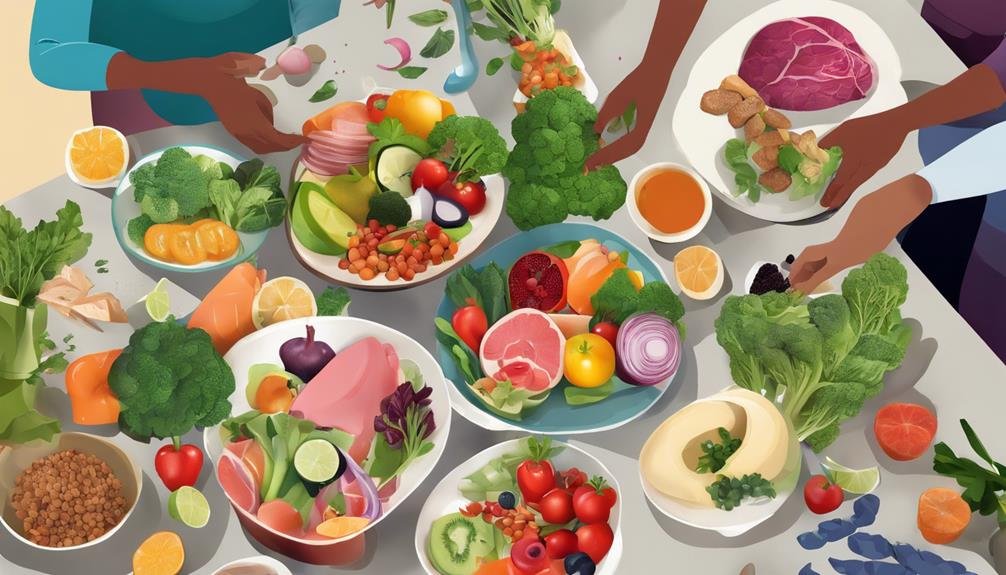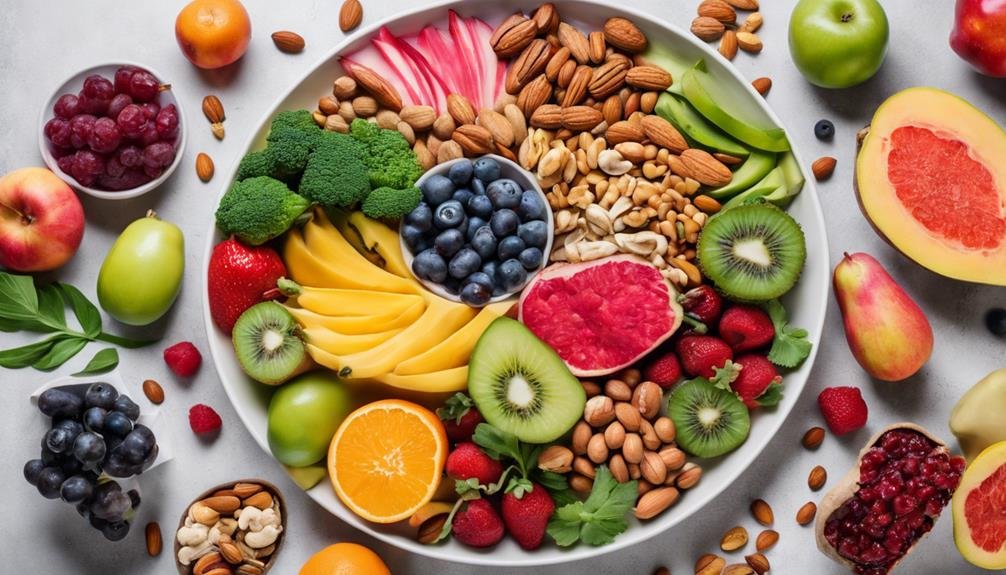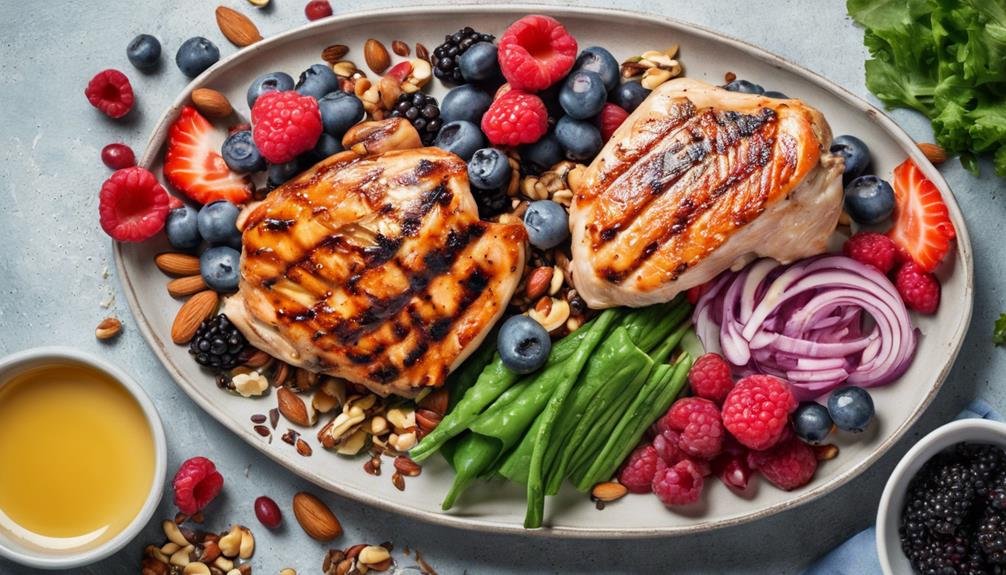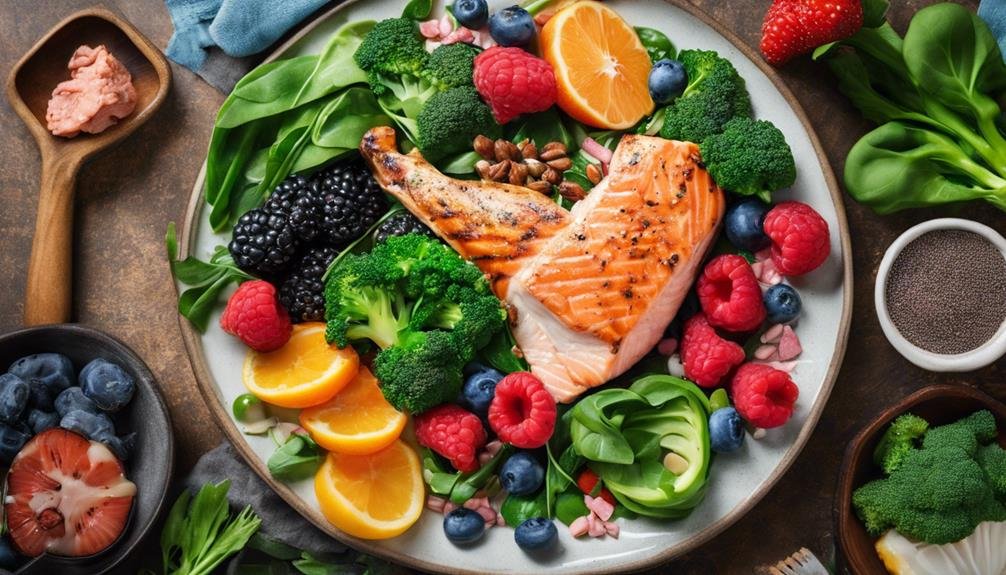In exploring the intricate relationship between the Paleo diet and cancer prevention, you'll find a compelling narrative woven through the principles of ancestral eating and modern scientific insights. Embracing a diet rich in whole foods and devoid of processed additives offers a promising avenue for bolstering your body's defenses against malignancies. But how exactly do these ancient dietary choices interact with our cellular machinery to fend off cancerous threats? Let's unravel the intricate tapestry of connections between Paleo dietary patterns and the intricate dance of cancer prevention mechanisms.
Origins of the Paleo Diet
The origins of the Paleo Diet can be traced back to the evolutionary principles of our ancestors. This dietary approach emphasizes consuming foods that our hunter-gatherer predecessors would have eaten during the Paleolithic era.
The premise behind the Paleo Diet is that our bodies are best adapted to the types of foods that were available to early humans, focusing on lean meats, fish, fruits, vegetables, nuts, and seeds.
By following a diet rich in whole, unprocessed foods, the Paleo Diet aims to promote overall health and well-being. The avoidance of processed foods, refined sugars, and grains is believed to reduce inflammation in the body, which is a common factor in many chronic diseases, including cancer.
Additionally, the high intake of fruits and vegetables in the Paleo Diet provides essential vitamins, minerals, and antioxidants that may help protect against cellular damage and support a healthy immune system.
Understanding the evolutionary basis of the Paleo Diet can offer insights into how our dietary choices can impact our health and potentially reduce the risk of certain diseases.
Nutrient-Dense Foods
Opt for foods that are packed with essential nutrients to fuel your body and support optimal health. When following the Paleo diet, prioritize consuming nutrient-dense foods that provide a range of vitamins, minerals, and antioxidants crucial for overall well-being. These foods not only offer nourishment but can also play a role in cancer prevention. Here are some key options to consider:
- Leafy Greens: Spinach, kale, and Swiss chard are excellent sources of vitamins A, C, and K, as well as minerals like iron and calcium.
- Wild-Caught Fish: Salmon, mackerel, and sardines are rich in omega-3 fatty acids, which have anti-inflammatory properties and may reduce cancer risk.
- Berries: Blueberries, strawberries, and raspberries are packed with antioxidants like anthocyanins, which can help protect cells from damage and lower inflammation levels.
Incorporating these nutrient-dense foods into your Paleo diet can provide your body with the essential building blocks it needs to thrive and potentially reduce the risk of cancer development.
Impact on Inflammation

Reducing inflammation is a key aspect of the Paleo diet's impact on overall health. The Paleo diet emphasizes whole, unprocessed foods rich in anti-inflammatory properties. By focusing on fruits, vegetables, nuts, seeds, and healthy fats like olive oil and avocado, the diet helps lower inflammation levels in the body. These foods contain antioxidants, vitamins, and minerals that combat oxidative stress, a major contributor to inflammation.
Additionally, the Paleo diet restricts processed sugars, refined grains, and trans fats, which are known to trigger inflammation. By eliminating these inflammatory culprits, the diet helps maintain a balanced inflammatory response in the body.
Studies have shown that reducing inflammation through dietary changes, such as those promoted by the Paleo diet, may lower the risk of chronic diseases, including cancer. Chronic inflammation has been linked to the development and progression of various types of cancer. Therefore, by following a Paleo diet rich in anti-inflammatory foods and devoid of inflammatory triggers, individuals may support their overall health and potentially reduce their cancer risk.
Role of Phytochemicals
To further understand the impact of the Paleo diet on cancer prevention, it's important to explore the role of phytochemicals in this dietary approach. Phytochemicals are bioactive compounds found in plants that have been shown to possess anticancer properties and play a significant role in reducing cancer risk. Here's how phytochemicals contribute to cancer prevention:
- Antioxidant Activity: Phytochemicals act as antioxidants, helping to protect cells from damage that can lead to cancer development.
- Anti-Inflammatory Effects: They've anti-inflammatory properties, reducing chronic inflammation in the body, which is linked to cancer progression.
- Detoxification Support: Phytochemicals support the body's natural detoxification processes, aiding in the elimination of potential carcinogens.
Gut Microbiome Influence
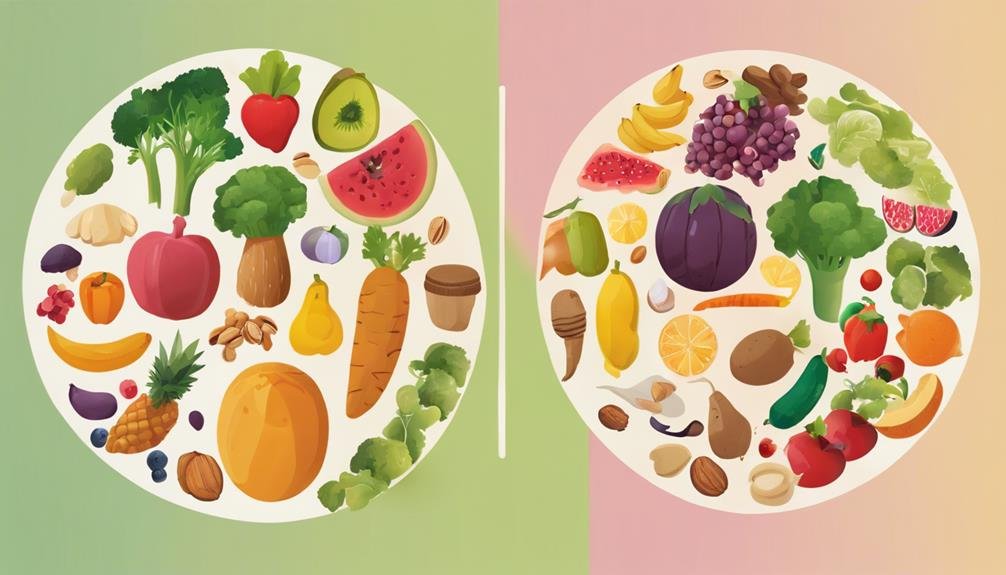
The influence of the gut microbiome on cancer risk and prevention is a topic of increasing interest in scientific research. Your gut is home to trillions of bacteria, fungi, and other microorganisms that play a crucial role in maintaining your overall health. Studies have shown that an imbalance in the gut microbiome, known as dysbiosis, can contribute to the development of various types of cancer.
A healthy gut microbiome helps regulate inflammation, supports the immune system, and aids in the digestion and absorption of nutrients. When the balance of beneficial and harmful bacteria in the gut is disrupted, it can lead to chronic inflammation and DNA damage, increasing the risk of cancer.
Sugar and Cancer Connection
Amidst the intricate web of factors influencing cancer development, the relationship between sugar consumption and cancer risk has garnered significant attention in scientific circles. Research suggests that excessive sugar intake may play a role in cancer development through various mechanisms:
- Promoting Inflammation: High sugar consumption can lead to chronic inflammation in the body, creating an environment that's conducive to cancer growth.
- Fueling Cancer Cells: Cancer cells have a heightened need for glucose to grow and proliferate. Excessive sugar consumption may provide these cells with the fuel they need to thrive.
- Disrupting Hormone Regulation: Sugar intake can affect insulin levels in the body, which in turn may promote the growth of certain types of cancers.
Insulin Sensitivity and Cancer

Insulin sensitivity plays a crucial role in the intricate relationship between metabolic health and cancer development. When your body becomes resistant to the effects of insulin, typically due to consistently high levels of glucose in the blood, cells may be exposed to excess insulin. This can promote the growth of tumors and cancer cells.
Research has shown that individuals with conditions like obesity and type 2 diabetes, which are linked to insulin resistance, have a higher risk of developing certain types of cancer.
Improving insulin sensitivity through dietary choices, such as adopting a Paleo diet rich in whole foods, lean proteins, and healthy fats, can help regulate blood sugar levels and potentially lower the risk of cancer. By reducing the consumption of processed sugars and refined carbohydrates, which can spike blood glucose levels and lead to insulin resistance, you can support your body in maintaining a healthy metabolic state that may contribute to cancer prevention.
Antioxidants in Cancer Prevention
Enhancing your body's natural defense mechanisms against cancer involves understanding the role of antioxidants in cancer prevention. Antioxidants are crucial in neutralizing harmful free radicals that can damage cells and lead to cancer development. Here's how antioxidants work to protect your body:
- Neutralizing Free Radicals: Antioxidants such as vitamins C and E, beta-carotene, and selenium help neutralize free radicals, preventing them from causing cellular damage.
- Supporting Immune Function: Antioxidants support a healthy immune system, which plays a vital role in identifying and destroying cancerous cells before they can multiply.
- Reducing Inflammation: Chronic inflammation can contribute to cancer development. Antioxidants help reduce inflammation, thereby lowering the risk of cancer.
Protein Quality and Cancer Risk

Moving forward from the discussion on antioxidants and their role in cancer prevention, it's important to shift focus to the impact of protein quality on cancer risk. Proteins are essential for cell growth, repair, and maintenance in the body. However, not all proteins are created equal when it comes to cancer prevention.
High-quality proteins, such as those found in lean meats, fish, eggs, and legumes, contain all the essential amino acids needed by the body. These proteins help support a healthy immune system and regulate cell growth, reducing the risk of cancer development.
Conversely, low-quality proteins, often found in processed meats and certain dairy products, lack essential nutrients and can contribute to inflammation and oxidative stress in the body, potentially increasing cancer risk.
Hormonal Balance Benefits
Occasionally, maintaining hormonal balance is a critical aspect of overall health, impacting various bodily functions, including metabolism, energy levels, and mood regulation. When following a Paleo diet, you may experience benefits related to hormonal balance that could contribute to cancer prevention. Here are some key advantages:
- Insulin Regulation: The Paleo diet's focus on whole foods and low glycemic index choices can help stabilize blood sugar levels, reducing insulin spikes that may be linked to cancer development.
- Balanced Cortisol Levels: By promoting a diet rich in nutrient-dense foods and healthy fats, the Paleo diet may support balanced cortisol levels, which play a role in stress management and immune function.
- Optimized Thyroid Function: The inclusion of iodine-rich foods like seafood in the Paleo diet can support thyroid health, potentially aiding in hormonal balance and overall well-being.
These hormonal balance benefits of the Paleo diet could play a significant role in reducing cancer risk and promoting overall health.
Cellular Metabolism Effects

When considering the impact of the Paleo diet on cancer prevention, it's essential to delve into its effects on cellular metabolism. The Paleo diet, rich in whole foods such as lean meats, fish, fruits, and vegetables, can influence cellular metabolism in ways that may help lower cancer risk. By emphasizing nutrient-dense foods and reducing processed sugars and grains, the Paleo diet supports a metabolic environment that discourages the growth of cancer cells.
The consumption of whole foods in the Paleo diet provides essential nutrients that support healthy cellular function and metabolism. By avoiding processed foods and sugars, which can lead to inflammation and oxidative stress in the body, the Paleo diet promotes a cellular environment less conducive to cancer development.
Furthermore, the emphasis on high-quality proteins and healthy fats in the diet can help regulate insulin levels and reduce the risk of insulin resistance, a factor linked to various cancers.
Research Studies and Findings
To understand the tangible impact of the Paleo diet on cancer prevention, it's imperative to examine the outcomes of research studies investigating its effects on cellular metabolism. Research in this area has provided valuable insights into how the Paleo diet may influence cancer development and progression.
Some key findings include:
- Improved Insulin Sensitivity: Studies have shown that following a Paleo diet can lead to improved insulin sensitivity, which is crucial in reducing the risk of certain types of cancer associated with insulin resistance.
- Reduced Inflammation: The anti-inflammatory properties of the Paleo diet have been linked to a decreased risk of inflammation-related cancers. By reducing chronic inflammation in the body, the diet may help in preventing the development of certain cancers.
- Enhanced Nutrient Intake: The emphasis on whole, unprocessed foods in the Paleo diet ensures a higher intake of essential nutrients and antioxidants, which are known to play a role in cancer prevention and overall health.
Frequently Asked Questions
Can the Paleo Diet Prevent All Types of Cancer?
The paleo diet may offer some cancer-preventive benefits due to its focus on whole foods rich in antioxidants and nutrients. However, it's essential to understand that no single diet can guarantee protection against all types of cancer.
While following a paleo diet can be a healthy choice, it's crucial to combine it with other lifestyle factors like regular exercise, avoiding smoking, and maintaining a healthy weight for comprehensive cancer prevention.
How Does the Paleo Diet Affect Chemotherapy Outcomes?
When undergoing chemotherapy, the paleo diet can positively impact outcomes. By focusing on whole foods like lean proteins, fruits, and vegetables, you provide your body with essential nutrients for healing and support. This diet may help reduce inflammation, support the immune system, and improve overall well-being during treatment.
Are There Specific Foods to Avoid on the Paleo Diet for Cancer Prevention?
To aid cancer prevention on the paleo diet, avoid processed foods high in sugar, refined grains, and trans fats.
Opt for whole foods like lean meats, fish, fruits, vegetables, and nuts that provide essential nutrients and antioxidants.
Stay hydrated and maintain a balanced diet to support overall health.
Prioritize organic options when possible to reduce exposure to pesticides and additives that may contribute to cancer risk.
Does the Paleo Diet Have Any Impact on Cancer Recurrence?
When it comes to cancer recurrence, the impact of the paleo diet is still being researched. While some studies suggest that the diet's focus on whole foods and avoidance of processed items may be beneficial, more evidence is needed to draw definite conclusions.
It's important to consult with healthcare professionals for personalized advice on how dietary choices may influence cancer recurrence risk. Stay informed and make choices that support your overall health and well-being.
Can the Paleo Diet Be Beneficial for Cancer Survivors?
Yes, the paleo diet can be beneficial for cancer survivors. By focusing on whole foods like lean proteins, fruits, vegetables, and healthy fats, the paleo diet can help support overall health and well-being. This type of diet may aid in reducing inflammation, improving immune function, and promoting a healthy weight—all of which are important factors for cancer survivors in their recovery journey. It's essential to consult with healthcare professionals for personalized advice.
Conclusion
In conclusion, the Paleo diet serves as a powerful weapon in the fight against cancer, arming your body with the nutrients it needs to combat inflammation and oxidative stress. Like a shield guarding against harm, this diet nourishes your cells, balances your hormones, and supports your gut health. Embrace the science behind the Paleo diet, and empower yourself to take control of your health and well-being.
